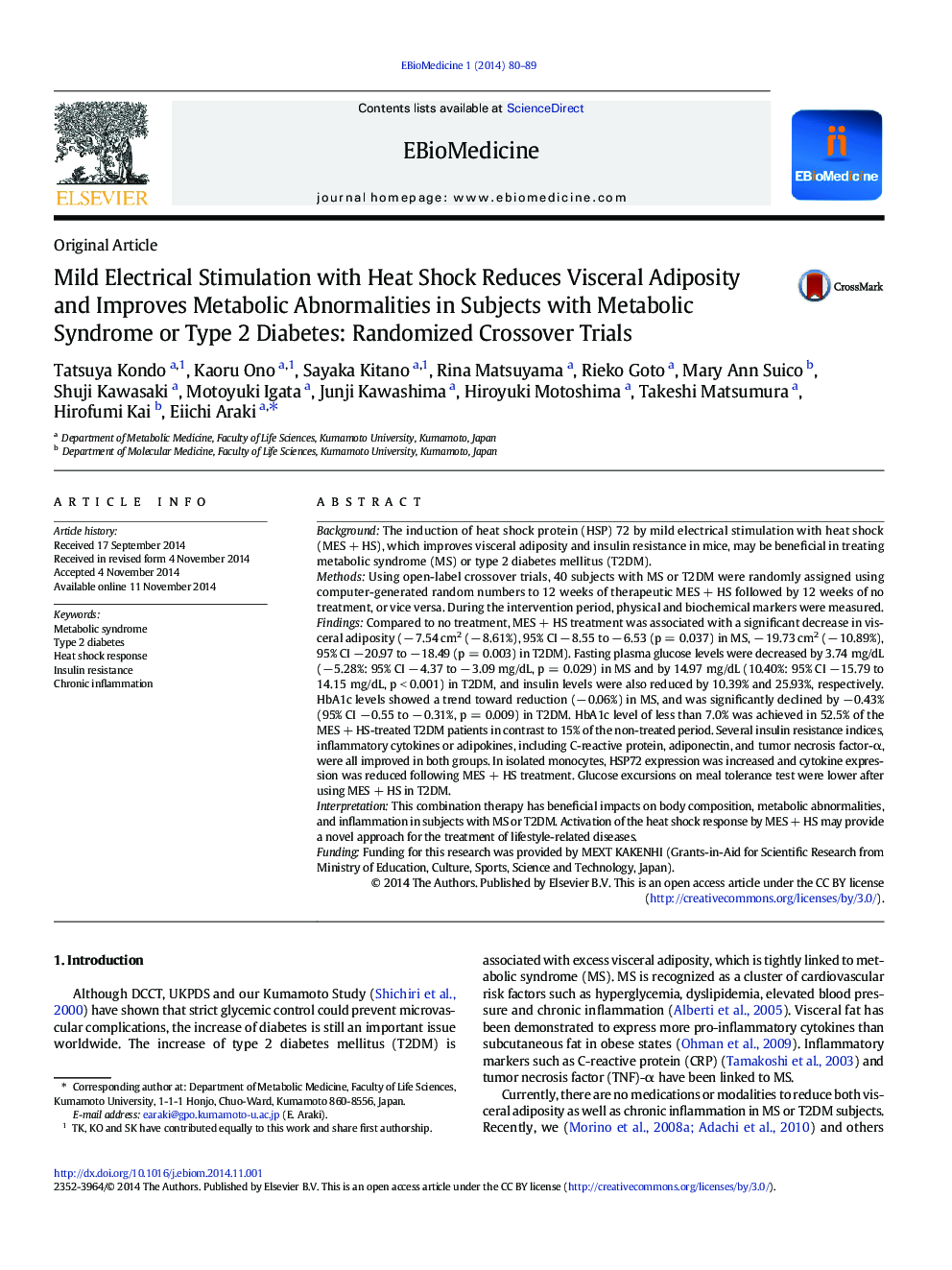| کد مقاله | کد نشریه | سال انتشار | مقاله انگلیسی | نسخه تمام متن |
|---|---|---|---|---|
| 2121152 | 1085770 | 2014 | 10 صفحه PDF | دانلود رایگان |
• We report the use of mild electrical stimulation with heat shock (MES + HS) in treating metabolic syndrome or type 2 diabetes.
• The treatment improves visceral adiposity, glucose homeostasis, insulin resistance and chronic inflammatory status.
• Our findings suggest that MES + HS might be a valuable therapeutic option for patients with these lifestyle-related diseases.
BackgroundThe induction of heat shock protein (HSP) 72 by mild electrical stimulation with heat shock (MES + HS), which improves visceral adiposity and insulin resistance in mice, may be beneficial in treating metabolic syndrome (MS) or type 2 diabetes mellitus (T2DM).MethodsUsing open-label crossover trials, 40 subjects with MS or T2DM were randomly assigned using computer-generated random numbers to 12 weeks of therapeutic MES + HS followed by 12 weeks of no treatment, or vice versa. During the intervention period, physical and biochemical markers were measured.FindingsCompared to no treatment, MES + HS treatment was associated with a significant decrease in visceral adiposity (− 7.54 cm2 (− 8.61%), 95% CI − 8.55 to − 6.53 (p = 0.037) in MS, − 19.73 cm2 (− 10.89%), 95% CI − 20.97 to − 18.49 (p = 0.003) in T2DM). Fasting plasma glucose levels were decreased by 3.74 mg/dL (− 5.28%: 95% CI − 4.37 to − 3.09 mg/dL, p = 0.029) in MS and by 14.97 mg/dL (10.40%: 95% CI − 15.79 to 14.15 mg/dL, p < 0.001) in T2DM, and insulin levels were also reduced by 10.39% and 25.93%, respectively. HbA1c levels showed a trend toward reduction (− 0.06%) in MS, and was significantly declined by − 0.43% (95% CI − 0.55 to − 0.31%, p = 0.009) in T2DM. HbA1c level of less than 7.0% was achieved in 52.5% of the MES + HS-treated T2DM patients in contrast to 15% of the non-treated period. Several insulin resistance indices, inflammatory cytokines or adipokines, including C-reactive protein, adiponectin, and tumor necrosis factor-α, were all improved in both groups. In isolated monocytes, HSP72 expression was increased and cytokine expression was reduced following MES + HS treatment. Glucose excursions on meal tolerance test were lower after using MES + HS in T2DM.InterpretationThis combination therapy has beneficial impacts on body composition, metabolic abnormalities, and inflammation in subjects with MS or T2DM. Activation of the heat shock response by MES + HS may provide a novel approach for the treatment of lifestyle-related diseases.FundingFunding for this research was provided by MEXT KAKENHI (Grants-in-Aid for Scientific Research from Ministry of Education, Culture, Sports, Science and Technology, Japan).
Journal: EBioMedicine - Volume 1, Issue 1, November 2014, Pages 80–89
